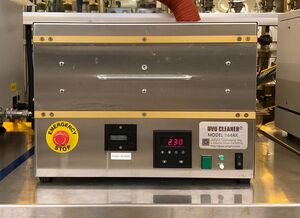Difference between revisions of "UV Ozone Reactor"
Jump to navigation
Jump to search
(Created page with "{{tool|{{PAGENAME}} |picture=Ozone.jpg |type = Dry Etch |super= Tony Bosch |location=Bay 5 |description = ? |manufacturer = ? }} = About =") |
(Updated tool template) |
||
| (8 intermediate revisions by 4 users not shown) | |||
| Line 1: | Line 1: | ||
| − | {{ |
+ | {{tool2|{{PAGENAME}} |
|picture=Ozone.jpg |
|picture=Ozone.jpg |
||
|type = Dry Etch |
|type = Dry Etch |
||
| − | |super= |
+ | |super= Lee Sawyer |
| + | |super2= Tony Bosch |
||
| + | |model=144AX |
||
|location=Bay 5 |
|location=Bay 5 |
||
| − | |description = |
+ | |description = UV Ozone Cleaner |
| − | |manufacturer = |
+ | |manufacturer = Jelight |
}} |
}} |
||
| − | = |
+ | ==About== |
| + | UV+O (atomic oxygen) cleaning method is a photosensitized oxidation process in which the contaminant molecules of photo-resists, resins, human skin oils, cleaning solvent residues, silicone oils, and flux are excited and/or dissociated by the absorption of short-wavelength UV radiation. Near atomically clean surfaces can be achieved in less than one minute. In addition, this process does not damage any sensitive device structures of MOS gate oxide. The system can be used for oxygen activation, etching or oxidation of a surface without ion bombardment. |
||
| + | |||
| + | ==Documentation== |
||
| + | |||
| + | *[[UV Ozone Quick Start|Quick Start]] |
||
| + | *[//wiki.nanotech.ucsb.edu/wiki/images/7/79/UV_Ozone_Manual_Jelight_M-144AX.pdf UV Ozone Manual] |
||
Revision as of 10:09, 8 September 2022
| ||||||||||||||||||||||||||||
About
UV+O (atomic oxygen) cleaning method is a photosensitized oxidation process in which the contaminant molecules of photo-resists, resins, human skin oils, cleaning solvent residues, silicone oils, and flux are excited and/or dissociated by the absorption of short-wavelength UV radiation. Near atomically clean surfaces can be achieved in less than one minute. In addition, this process does not damage any sensitive device structures of MOS gate oxide. The system can be used for oxygen activation, etching or oxidation of a surface without ion bombardment.
